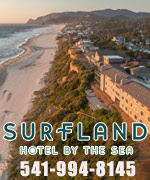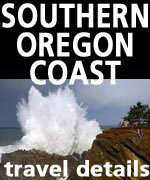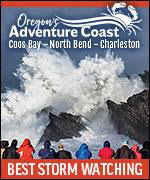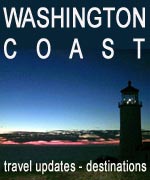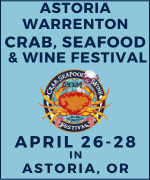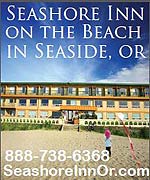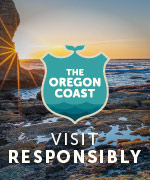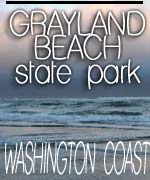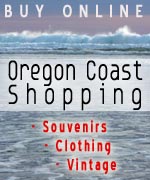Extraordinary Encounter on Oregon Coast: Unusual Beach Noises, Video
Published 09/08/2017 at 5:27 AM PDT - Published 09/08/2017 at 5:57 AM PDT
By Oregon Coast Beach Connection staff
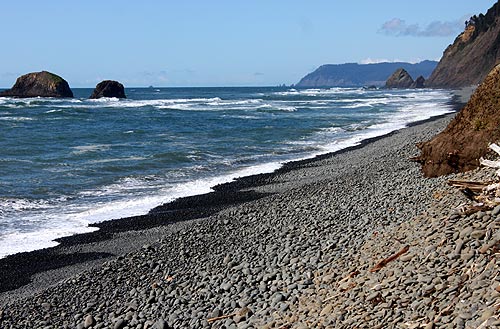
(Oregon Coast) – That calming, cajoling sound of the waves lapping on the beach is an irresistible one. A constant refreshing of the soul seems to happen with each incoming breaker.
Yet it's not the most interesting sound the beaches make.
Sometimes, under the rarest conditions, you can hear something extraordinary: sands that sing, talking barnacles or maybe the delightful “magic rocks.” The audio portion of the Oregon coast has some major surprises on occasion.
Magic Rocks. (Photo above: Falcon Cove Road, known as Magic Rocks Beach). In a few spots along the Oregon coast, and sometimes it takes the right conditions, you may hear a surreal rattling noise coming from the rocks at the tide line.
It’s as if the tides momentarily give them life, as they shimmy, shake and shudder while making an almost chirping sound, like giant Mexican jumping beans that have grown to freakish size and now inhabit the tideline.
It's been nicknamed “magic rocks” by some locals, mostly because one beach near Arch Cape actually has the nickname of Magic Rocks Beach.
You have to have large, rounded cobblestones at the tideline to do it. The water bounces them around and causes them to clatter against each other.
North coast geologist Tom Horning said it almost always happens next to large basalt headlands, which produce the stones that then get rounded out by the tides. The three best spots for this are the secret beach at the end of Falcon Cove Road (near the Arch Cape Tunnel, between Manzania and Cannon Beach), the blackened rock beach below Newport's Yaquina Head, and the village of Cape Meares, at the beginning of the Bayocean Spit.
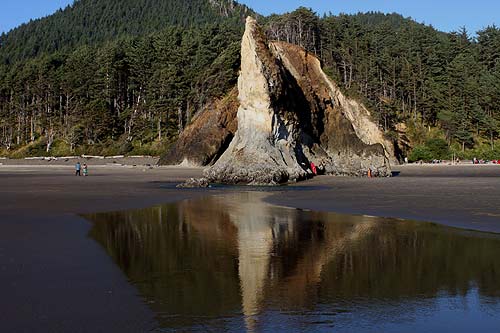
Singing Sands and Squeaking Sands. Singing sands is extremely rare on this coast and mostly found – if at all – in some parts of the National Dunes Recreation Area south of Florence. It's essentially a once in a lifetime find. Sometimes, it sounds like distant voices singing. Others, it's a bit like a violin or an odd, elongated squeaking noise. All this only happens under certain conditions, when two different kinds of sands grind together under the right degree of humidity.
It has been documented in Waldport briefly in the '70s, however.
Slightly more common is the squeaking sands phenomenon, which can be found on many beaches on the Oregon coast – but it takes very exact and rare conditions. It seems to occur a bit more in the Cannon Beach area, including beaches south of there such as at Arcadia State Park (photo above). This presents itself as a squishing, squeaking noise as you walk on the beach.
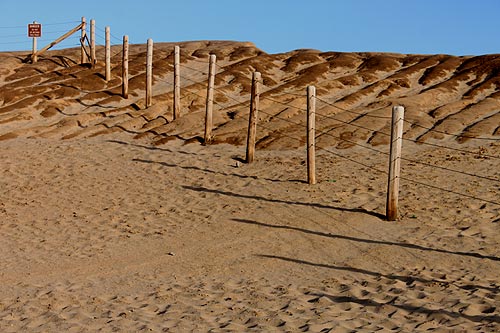
Singing Cape Kiwanda. The vast, loose dune on top of Pacific City's Cape Kiwanda can create some wild, whistling noises when the wind gets going. It may be more the wire fences along the edges that are causing that when they are hit by wind – it's difficult to tell. That whistle can be a bit of a howl at times, however. It's a fascinating sound.
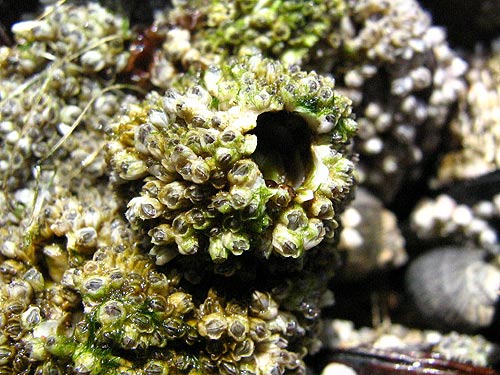
Talking Barnacles. If you're ever in a large tide pool area, listen very closely. You may hear a faint grinding or clicking sound. It's coming from the barnacles, and it sounds like they're talking.
The noise comes from the tiny creatures moving around inside their shells. Keith Chandler, manager of Seaside Aquarium, said the acorn barnacle has two shells that it lives inside. You can see them squirming around in there.
“It happens when they twist around inside their shells, when something disturbs them," Chandler said.
It doesn't take much to disturb them, either. A shadow passing over them can cause them to do this. The chattering is often brief as well. Oregon Coast Hotels in these areas - Where to eat - Maps - Virtual Tours
Cannon Beach Lodging
Nehalem Bay Lodgings
Manzanita Hotels, Lodging
Three Capes Lodging
Pacific City Hotels, Lodging
Lincoln City Lodging
Depoe Bay Lodging
Newport Lodging
Waldport Lodging
Yachats Lodging
Oregon Coast Vacation Rentals
Oregon Coast Lodging Specials
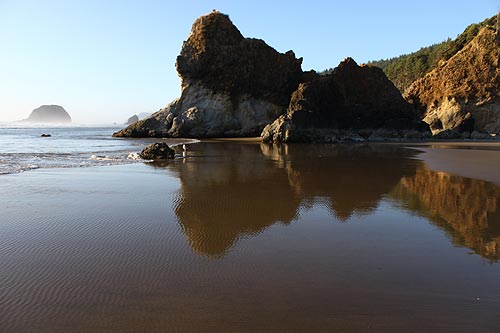
More About Oregon Coast hotels, lodging.....
More About Oregon Coast Restaurants, Dining.....
LATEST Related Oregon Coast Articles
One was a rare orca find; both suspected human interaction. Marine sciences
N. Oregon Coast's 'Cheese War' a Quiet Part of Tillamook-Area History: See th...
History talk in Nehalem on April 26 about Tillamook battles. Manzanita events, Cannon Beach events, Tillamook events
Lyrid Meteors with a Possible Side of Aurora for Washington, Oregon, Coastlines
Lyrids peak on Monday, northern lights possible northern Washington. Weather
Road Work Coming to North Oregon Coast's Gearhart and One of World's Largest ...
Lane closures this summer on the bridge; major work in Gearhart next year. Washington coast
Be Jeweled Returns to Central Oregon Coast, Newport's Dazzling, Arty Jewelry ...
Saturday, May 10, from 10 AM to 4 PM featuring more than 2,000 pieces. Newport events
N. Oregon Coast Bridge Work During Travel Season: Some Traffic Delays on Asto...
Occasional one-lane traffic from June through September at Astoria / Ilwaco. Washington coast
Cape Kiwanda's Colossal Sand Dune: Wild Oregon Coast Rides and How It's Changing
A mix of crazy recreation with science of a crumbling landmark. Sciences, Pacific City, Oceanside
Oregon Coast, Valley and Likely Washington Coast to Get Some Aurora Borealis ...
Likely just before dawn best hour but peak happens during daylight. Weather
Back to Oregon Coast
Contact Advertise on BeachConnection.net
All Content, unless otherwise attributed, copyright BeachConnection.net Unauthorized use or publication is not permitted







